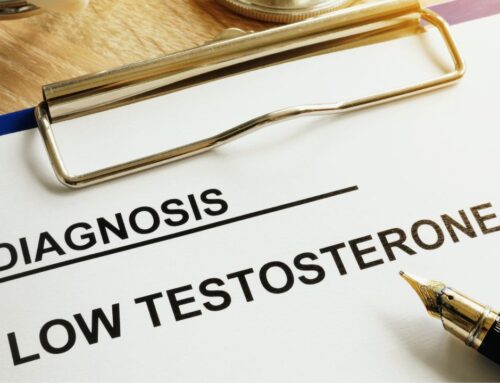If you’re a man in your 30s or older you may have noticed an increase in anxiety or anxiety-like symptoms. Between work stress, normal life stress, and the many ways our bodies and hormones change with age, you may have found yourself wondering, “can low testosterone cause anxiety?”Research shows that low testosterone levels and other male hormonal imbalances can influence mood, stress response, and even neurotransmitter activity in the brain. That means hormonal health plays a major role in men’s health—not just in physical strength and sex drive, but also in mental clarity and emotional stability.The good news? A functional medicine approach—like that offered through KS Wellness’s Elite Wellness Program—can help identify root causes of hormone issues and build a sustainable treatment plan for long-term wellness. Rather than relying solely only on testosterone replacement therapy (TRT) or a quick fix, this program focuses on whole-person health—hormones, nutrition, sleep, stress, and lifestyle—for optimal vitality.
What Causes Low Testosterone in Men?
Hypogonadism, the medical term for a condition in which the body doesn’t produce enough testosterone, can occur at any age but becomes more common as men grow older. Several factors contribute to lowerlevels of testosterone, and they don’t all stem from aging alone.Testosterone naturally declines with age, but chronic stress, poor nutrition, and inadequate physicalactivity also disrupt the body’s delicate sexhormone balance. Diets high in sugar and processed foods can interfere with hormone production, while sedentary lifestyles reduce muscle mass and increase fat accumulation—both of which lower testosterone. At the same time, overtraining without proper recovery can create hormonal dysfunction.Other contributing factors include sleep apnea and other sleep disorders that interfere with restorative rest; obesity and insulin resistance, which can convert testosterone into estrogen; and chronic medical conditions like thyroid disorders, pituitary dysfunction, or metabolic syndrome. Even certain mental health disorders, including depression, can correlate with altered hormone levels.The result? Many men fall below the normal range for testosterone, leading to a wide spectrum of physical, emotional, and cognitive symptoms.
Signs and Symptoms of Low Testosterone
Low testosterone can show up in surprising ways. While some men recognize the more obvious physical symptoms, others experience mood changes that are harder to connect to hormones. Here are the most common signs of low testosterone:
- Physical symptoms: fatigue or low energy, decreased muscle mass, weight gain and excess body fat, reduced bone density, and erectile dysfunction.
- Sexual dysfunction: lowered sex drive, difficulty with erections, or decreased sexual satisfaction.
- Mental and emotional symptoms: mood swings, brain fog and difficulty concentrating, irritability, symptoms of depression, and persistent symptoms of anxiety.
- Sleep disturbances: poor sleep quality or conditions like sleep apnea, which further reduce testosterone production.
Because testosterone affects the balance of neurotransmitters like serotonin and dopamine, men with low testosterone often notice mood-related issues. In fact, research shows that reduced testosterone can influence anxiety levels much like imbalances in serotonin might. This overlap explains why some men are prescribed antidepressants or even referred to psychiatry professionals for depression and/or anxiety disorders when their underlying issue may be hormonal.
Can Low Testosterone Really Cause Anxiety?
Yes. Testosterone is not only a sex hormone—it plays a role in regulating the brain’s chemistry. Men with low testosterone levels frequently report symptoms of anxiety such as restlessness, irritability, nervousness, and difficulty focusing.When levels of testosterone fall below the normal range, the balance of mood-regulating neurotransmitters may shift, leading to increased anxiety or depressive symptoms. For some men, this shows up as subtle changes in confidence or motivation; for others, it escalates to clinical mental health disorders such as generalized anxiety or major depression.This connection also helps explain why testosterone therapy or testosterone treatment sometimes relieves anxiety symptoms. While not a magic bullet, restoring free testosterone to optimal levels may improve mood, energy, and resilience against stress.
Traditional Testosterone Treatments vs. Functional Medicine
Most conventional doctors, when they detect low testosterone levels, may prescribe testosterone replacement therapy (TRT) or other forms of testosterone therapy. While TRT can be an effective treatment for many men, it often functions as a band-aid solution if not paired with a deeper understanding of lifestyle, stress, and metabolic health.Some men respond well to TRT alone; others notice only partial relief, or even new complications, if the root issues aren’t addressed. For example, without correcting poor sleep or excess stress, symptoms may persist even with testosterone support.That’s where functional medicine offers something different. Instead of focusing solely on replacing hormones, functional medicine providers like Dr. Siddiqi evaluate the whole picture: nutrition, exercise, sleep, stress, and medical conditions that might be affecting testosterone production. The goal is to uncover why your body has lower levels of testosterone in the first place and create a treatment plan that addresses both the symptoms and the root cause.
Functional Medicine: A Root-Cause Approach to Men’s Hormonal Health
Functional medicine recognizes that men’s health is influenced by more than lab values. Hormones interact with metabolism, cardiovascular health, gut health, and mental wellness. Instead of a “one-size-fits-all” prescription, functional medicine emphasizes:
- Personalized testing: measuring total and free testosterone, thyroid hormones, cortisol, nutrient status, and more.
- Lifestyle optimization: improving sleep, reducing stress, encouraging balanced physical activity, and building sustainable nutrition habits.
- Targeted supplementation: supporting hormone production with nutrients like zinc, vitamin D, magnesium, or adaptogens like ashwagandha.
- Bioidentical hormone therapy: when appropriate, prescribing hormones that match the body’s natural chemistry for safer long-term outcomes.
This comprehensive approach helps men avoid unnecessary or premature reliance on TRT alone, while still offering testosterone treatment when it is the most effective treatment for restoring balance and improving quality of life.
The Role of KS Wellness’s Elite Wellness Program
Men in Sugar Land have access to a local solution through KS Wellness’s Elite Wellness Program. This program is built around functional medicine principles, offering a full-circle approach to men’s health and hormonal balance.
What the Program Includes:
- Proactive hormone testing: evaluating levels of testosterone, as well as thyroid function, cortisol, cholesterol, and metabolic markers.
- Comprehensive support: from nutrition coaching and exercise planning to stress reduction techniques and supplement guidance.
- Access to hormone therapies: including bioidentical hormone replacement therapy (BHRT) or testosterone replacement therapy if your labs show it’s necessary.
- Long-term coaching and monitoring: ensuring your treatment plan adapts as your needs evolve.
- Specialist referrals: seamless access to endocrinology, cardiology, or psychiatry when complex issues arise.
Why This Matters for Anxiety and Hormone Health
When addressing anxiety, many men are prescribed antidepressants to regulate serotonin or other neurotransmitters. While medications can help, they don’t always address the hormonal foundation contributing to mood changes. In some cases, men benefit more from testosterone therapy or a carefully structured treatment plan that restores hormone balance alongside lifestyle changes.By partnering with a healthcare provider trained in functional medicine, you gain access to medical advice with a more nuanced understanding of how symptoms of low testosterone—from fatigue and weight gain to sexual dysfunction and mood shifts—connect with your mental and emotional health.
Next Steps: What to Do If You Suspect Low T
If you’re experiencing symptoms of anxiety, fatigue, poor libido, or other signs of low testosterone, it’s time to seek professional guidance. Don’t self-diagnose or start supplements without proper evaluation. Instead:
- Schedule a consultation with a qualified healthcare professional—ideally one experienced in functional medicine.
- Get comprehensive hormone testing to measure your levels of testosterone, thyroid function, cortisol, and other key markers.
- Explore your treatment options, from lifestyle changes and supplements to TRT or BHRT if medically appropriate.
- Commit to a holistic treatment plan that improves both your physical symptoms and your mental well-being.
Conclusion
So, can low testosterone cause anxiety? Absolutely. Men with low testosterone levels often experience mood swings, increased anxiety levels, and even symptoms of depression due to changes in neurotransmitters like serotonin. But the answer isn’t always a simple prescription for TRT.A functional medicine approach, like Dr. Siddiqi’sElite Wellness Program in Sugar Land, TX, helps men move beyond temporary fixes and toward true, long-lasting vitality. By addressing the root causes of hormonal imbalance and providing tailored testosterone treatment when necessary, KS Wellness empowers men to regain energy, confidence, and emotional balance.If you’re concerned about yourhormone levels, struggling with signs of low testosterone, or wondering if anxiety might be linked to your hormones, now is the time to act. Reach out toKS Wellness, invest in the Elite Wellness Program, and take the first step toward restoring balance, improving your mental and physical health, and living at your full potential.





